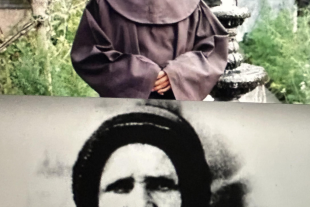Australian reflection on Trinity Sunday

Dr Miriam Rose Ungunmerr-Baumann in Rome for Reconciliation Week. Image: David Leigh Dodd
Source: Columbans Australia
In today's second reading from Paul's Second Letter to the Corinthians for the feast of the Holy Trinity, Paul tells us: 'Brothers and sisters, rejoice. Mend your ways, encourage one another, agree with one another, live in peace, and the God of love and peace will be with you. Greet one another with a holy kiss. All the holy ones greet you. The grace of the Lord Jesus Christ and the love of God and the fellowship of the Holy Spirit be with all of you.' What an appropriate message for us as we conclude National Reconciliation Week.
I have been very blessed to spend the week in Rome marking the 50th anniversary of diplomatic relations between Australia and the Holy See. I have been privileged to accompany Miriam Rose Ungunmerr-Baumann, the Aboriginal educator and artist from Nauiyu Nambiyu on the banks of the Daly River. Miriam came to the Eternal City with her message of 'dadirri', calling people to a deep, interior listening.
My week started by concelebrating at the Pope's Mass for Pentecost when he told us:
'In our world today, there is so much discord, such great division. We are all "connected", yet find ourselves disconnected from one another, anaesthetized by indifference and overwhelmed by solitude….Hence, the Lord, at the culmination of his Passover from death to life, at the culmination of salvation, pours out upon the created world his good Spirit: the Holy Spirit, who opposes the spirit of division because he is harmony, the Spirit of unity, the bringer of peace. Let us invoke the Spirit daily upon our whole world, upon our lives and upon any kind of division!'[1]
On Wednesday, the Australian embassy arranged for Miriam and me to attend the Pope's general audience. Miriam, having been the principal of St Francis Xavier's school at Daly River, was delighted that Pope Francis spoke about Xavier and the great Jesuit missionary to China, Matteo Ricci. Francis spoke of Ricci's persistence and consistency - traits so necessary if we are to achieve national reconciliation in the wake of our colonising past.
For Ricci, 'It took eighteen years, with four stages through four different cities, to arrive in Peking, which was the centre.' 'With perseverance and patience, inspired by unshakeable faith, Matteo Ricci was able to overcome difficulties and dangers, mistrust and opposition. Think that, in that time, on foot or riding a horse, such distances… and he went on. But what was Matteo Ricci's secret? By what road did his zeal drive him? He always followed the way of dialogue and friendship with all the people he encountered, and this opened many doors to him for the proclamation of the Christian faith.'[2]
Dialogue and friendship - the keys to reconciliation. Francis concluded his address at the General audience with a question: 'Brothers and sisters, today we, each one of us, let us ask ourselves inwardly, "Am I consistent, or am I a bit 'so-so'?"'
That evening we gathered at Domus Australia where Cardinal Arthur Roche, Prefect for the Dicastery for Divine Worship and the Discipline of the Sacraments, wearing my ordination vestment designed by Miriam Rose and woven by my mother, celebrated Mass marking the 50th anniversary of the first national Aboriginal liturgy held in the Myer Music Bowl in Melbourne during the 1973 Eucharistic Congress.
On Thursday we celebrated mass together with a handful of Australians in the rooms of Ignatius Loyola marking the first anniversary of my father Gerard's death. We recalled Gerard's words in the Mabo judgment:[3]
'If it were permissible in past centuries to keep the common law in step with international law, it is imperative in today's world that the common law should neither be nor be seen to be frozen in an age of racial discrimination. The fiction by which the rights and interests of indigenous inhabitants in land were treated as non-existent was justified by a policy which has no place in the contemporary law of this country.'
On Friday, we went to St Paul's Outside the Walls. A Benedictine monk brought us to the site where the young Aboriginal boy Francis Conaci was buried in September 1853. Conaci and his younger companion John Dirimera from New Norcia had left home on 9 January 1849 and been brought to Rome by Dom Salvado for training as Benedictine monks. They had been presented with their religious habits by Pope Pius IX who said of Conaci, 'Australia needs a second Francis Xavier; may the Lord bless this boy, and make him into one!' Francis died on 17 September 1853, a very long way from home, a world away from his country.
On the day after the canonisation of Mary MacKillop on 17 October 2010, a group of us had gathered around his burial place and were moved to tears. The didgeridoo was played; a traditional dance was performed. Aboriginal elders led the prayers and the singing of the Aboriginal Our Father and of 'The Old Wooden Cross' (the hymn which is sung at most Aboriginal funerals).
En route to Rome, Salvado, Conaci and Dirimera had passed through Paris where there was civil disruption on the streets following the workers' revolt of the previous year. Soldiers were pursuing some rioters through the streets on 13 June 1849. Discussing the need for national reconciliation, we recalled Salvado's account of that Paris episode:
'One of my boys, agitated by this extraordinary display, asked me what it was all about. I told him that some of those who had just rushed by shouting were bad men, and that the soldiers were going to fire on them if they failed to keep the peace.
"But I see", said the boy, "that the others have rifles too. Who will win?"
"There are only a few of the bad men," I replied, "and so the soldiers will win."
He was silent for a few minutes, and then he went on: "Why don't you go between the soldiers and the bad men, take all their weapons away, and lock them up in this house and stop them from fighting - and the two of us will help you?"
"Because this is not my country, and I don't know anyone here", I replied.
"That doesn't matter. You don't belong to my country either, and you didn't know the natives, but when they were getting ready to fight or had already started, you went in among them, took their gidjis, shut them up in the Mission house and it was all over. Why don't you do the same here?" This argument, which was so much to the point and so unexpected from a boy who eight months before was wandering naked in the bush and was as uncivilized as only a native can be, left me bereft of a satisfactory reply. I did not want to tell him that in a case like this, it was easier to get good results from natives than from those who boasted they had reached the acme of civilization.'[4]
During the week, Francis reminded us that without the Spirit, 'the Church is lifeless, faith is mere doctrine, morality mere duty, pastoral work mere toil.'
Flying home in preparation for the referendum on constitutional recognition of the First Australians and constitutional entrenchment of a Voice, I carry with me the observations of Pope Francis during this National Reconciliation Week just past: 'Do I foster reconciliation and build communion, or am I always on the lookout, poking my nose into problems and causing hurt, spite, division and breakdown? Do I forgive, promote reconciliation and build communion? If the world is divided, if the Church is polarized, if hearts are broken, let us not waste time in criticizing others and growing angry with one another; instead, let us invoke the Spirit. The Spirit is able to resolve all of this.'[5]
Approaching Rome in 1537, St Ignatius Loyola stopped on the outskirts at La Storta and there he had a vision of Jesus saying to him: 'Ego vobis Romae propitious ero' (I will be propitious to you in Rome).
Having enjoyed National Reconciliation Week with Miriam Rose calling us to a deep inner listening, I too have been blessed in the Eternal City.
See: https://catholicoutlook.org/fr-frank-brennans-homily-for-trinity-sunday/
Listen at: https://soundcloud.com/frank-brennan-6/homily-4623


















